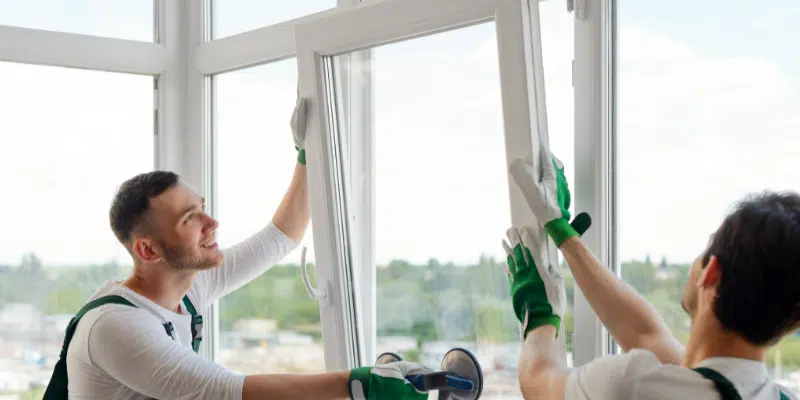Exterior window condensation is often seen as a sign of energy-efficient windows, especially during certain weather conditions. While it might raise concerns for homeowners, this type of condensation is usually not a problem that needs fixing.
In this guide, we’ll explore why exterior condensation occurs, what it means for your windows, and what you can do about it. This is also two of three in a series breaking down condensation issues with windows, if you want to learn more.
Why Energy-Efficient Windows Cause Condensation
One of the primary reasons you might notice condensation on the outside of your windows is due to the high energy efficiency of the glass. Triple-glazed windows, for example, are designed to prevent heat transfer between the inside of your home and the outside environment. This insulation is so effective that the exterior glass can cool down more rapidly than less efficient windows, leading to the formation of condensation when the outdoor air is warm and humid.
Is It a Problem?
Fortunately, this type of condensation indicates that your windows are performing as intended. The airtight seal and insulating properties are keeping your home comfortable and energy-efficient. No action is needed to correct this issue. In fact, seeing condensation on the outside can be a reassuring sign that your investment in energy-efficient windows is paying off.
How do I Get Rid of It?
If you still want to reduce or eliminate exterior condensation, here are a few simple steps:
- Increase Airflow: Ensure good air circulation around your windows by trimming back any plants or bushes that may be close to the glass.
- Wipe it Off: If you need to remove the condensation quickly, you can simply wipe the exterior of the window with a dry cloth.
- Wait for the Sun: Often, the easiest solution is just to wait. The morning sun will naturally evaporate the condensation as it warms the glass.
These quick fixes should help manage exterior condensation without much effort.
How Weather Affects Exterior Condensation
Weather plays a significant role in the formation of condensation on the outside of windows. Even if you don’t have ultra-efficient windows, this can happen to any glass, including on your car.
You’ll most likely notice this phenomenon in the early morning hours, particularly during late summer and early fall. As nighttime temperatures drop, the exterior surface of your windows can become cooler than the surrounding air. When the warm, moist air comes into contact with the cold window surface, condensation forms, much like dew on grass.
How to Deal with Exterior Condensation
If you notice condensation on your windows in the morning, the simplest solution is to wait for the sun to rise. As the day warms up, the condensation will naturally evaporate. There’s no need for concern or additional measures.
However, if you’d like to minimize condensation, ensuring good air circulation around the exterior of your home can help. Trimming back vegetation near windows and keeping outdoor surfaces dry may reduce the likelihood of condensation forming.
To Summarize
Exterior window condensation occurs when the temperature of the glass surface is cooler than the dew point of the surrounding air, even when the air is warm. This typically happens in the early morning after a cool night, especially during late summer or early fall.
Here’s why:
- Temperature Drops at Night: After a warm day, nighttime temperatures can drop significantly, especially in regions with a large temperature variation between day and night. The windows, particularly energy-efficient ones, cool down faster than the surrounding air.
- Warm, Moist Air in the Morning: When the sun rises and the air warms up, but the window glass is still cooler, the moisture in the warm air condenses on the cooler glass surface.
So, even if the outside air is warm, the window’s surface can still be cool enough to cause condensation due to the residual coolness from the night.
This type of condensation is generally harmless and indicates that your windows are effectively insulating your home. It also will fade away naturally as the sun comes up. If the problem persists beyond that, though, be sure to reach out to a window technician.
Want to Know More About Window Care? Contact Us Today!
If you have questions about your windows or want to explore energy-efficient options for your home, we’re here to help. Contact Linton Window & Door for expert advice and tailor-made solutions.

